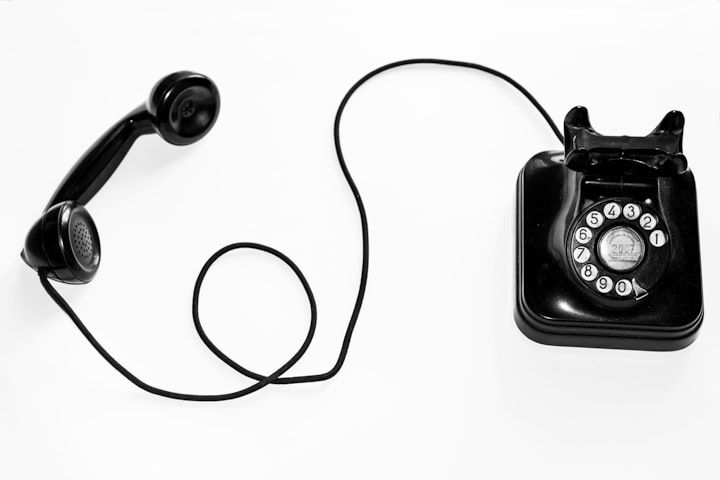I pick up the call. On the other end, someone is crying too hard to get the words out.
I say, “This is the Cancer Information Service. How can I help you today?”
The person on the other end pauses. I can hear them swallow, sniff, take a deep breath. Still, the words don’t come.
I know this moment. I live this moment every single day. An average shift has at least two or three, sometimes more. I wait.
“I’m sorry. Are you there?” I let them say it, give them the grace, the opportunity to pull themselves together.
“Yes, I’m here,” I say. “It sounds like you’re dealing with something really difficult. I’m happy to help you in any way I can. Take your time.”
Sometimes it’s a second. Sometimes it’s thirty. Sometimes, they’re not ready; they hang up. Today, it’s just a quick pause.
“My mother just got diagnosed with breast cancer.”
We don’t have scripts at this call center - no canned phrases, no stock answers. It was three months of training before I was allowed to answer the phone. I studied basic biology, learned how to read medical textbooks, and listened to experienced Information Specialists take call after call. Nobody I trained with had any medical background. We were hired because we cared. Because we could talk comfortably about hard things.
“I’m so sorry to hear that. I’m glad you were able to call. I have a lot of information about breast cancer, if you have questions.”
Another pause. “I don’t know where to begin,” she confesses. “I feel like all I know about breast cancer is pink ribbons and chemo that makes your hair fall out.”

“Well, everyone’s gotta start somewhere,” I say, hoping she can hear the little smile in my voice. She rewards me with a weak chuckle. I feel more confident now; she’s made herself vulnerable, first by letting me hear her cry, and then by admitting how little she knows. She needs a guide.
“I’m going to start with a little explanation of how cancer works,” I tell her. I can almost hear her nodding. “Don’t worry about writing it down; I can follow this call with an email with some booklets that cover everything we talk about. You can share those with friends and family, too.”
This time I get an audible, “That sounds good, thanks.”
I take a breath. It’s hard to describe what exactly is so rewarding about being with people through one of the worst moments of their lives, but I wouldn’t trade it for anything. I’ve given versions of this little speech a dozen times today already, but it never gets old.
“Think of your body as a factory that produces many kinds of cells - skin cells, stomach cells, blood cells, and yes, breast cells. Millions of cells each day, right? And like any factory, it will produce many, many good cells each day. But sometimes, a faulty cell gets made. Maybe it has a genetic defect that changes its size, shape, or color. Faulty cells get made all the time - it’s the price of doing business.”
I pause, waiting to see if she’s following me. I get the “Okay, that makes sense,” and keep going.
“Like a factory, the body has a quality control system. When a faulty cell comes through, that quality control system kicks in and neutralizes the cell. Sends it to the cellular junkyard. But sometimes, a cell will come through that looks right enough that the body doesn’t recognize it as faulty, and lets it through the quality control system. The kind of changes we’re talking about are related to cell growth. Some cells get badly programmed to reproduce much faster than normal cells. If they get through the body’s screening system, they can set up shop and start replicating cell after cell. These cells aren’t good at doing their actual jobs of being your blood or skin or breasts - they just know how to do one thing. Grow. And once they grow enough, they become visible on a scan.”

“A tumor,” she says. I can hear the new understanding in her voice, the sudden clarity, and I remember exactly why I’m here. I’m not her anchor, or her port in this storm. My information will help her get her own feet under her, empower her to ask the right questions, move forward. My information isn’t a comfort - it’s a tool. A light in the dark.
We talk for another few minutes, and wrap up. I don’t usually offer much more than the basics with someone who comes in knowing so little. The booklets I’ll send her will go into more detail.
The next call is from a doctor, wanting information about clinical trials for pancreatic cancer. I've got the links emailed to her before our call is over. The one after that, someone wants to know if there’s an accredited cancer center close to their home. I list three, and suggest starting with the one that's part of their current health system.
The one after that has called our number before, and asks me about the differences between two types of chemotherapy his doctor is suggesting.
“You were so helpful last time,” he says. “I was so lost.”
There are calls that leave me frustrated, or angry - people who couldn’t go to the doctor until it was too late because it cost too much, people who call because they’re getting evicted from their homes in the middle of chemo, people who call because insurance won’t cover the treatment they need. There are more ways than illness to break someone.
There are the calls from the desperate. “The doctor wants to put him in hospice, but there has to be something else we can try.” Sometimes I can get through to them; sometimes I can’t. I can say over and over in my gentlest voice that doctors will not suggest hospice unless they think the patient will die soon, with or without treatment, but they have to be ready to hear it.
Even when I have no good news for them, they thank me. For listening. For being patient, or kind. For telling them what I can. Sometimes, they put me on speakerphone and let everyone in the family pepper me with questions until they’ve finally exhausted their worries for the moment.
Information is power. Information offers control, structure. It does not fix, or cure, or heal. But what I offer on the phone lines is a small light in the dark: it won’t take you all the way out, but it’ll help you find your next step.
*
If you would like to talk to the incredible folks at the Cancer Information Service, visit www.cancer.gov to chat with someone online, or call 1-800-4CANCER (1-800-422-6237) The Cancer Information Service is open Mon-Fri from 9am-9pm Eastern.
About the Creator
Dane BH
By day, I'm a cog in the nonprofit machine, and poet. By night, I'm a creature of the internet. My soul is a grumpy cat who'd rather be sleeping.
Top Story count: 17
Check out my Vocal Spotlight and my Vocal Podcast!
Reader insights
Outstanding
Excellent work. Looking forward to reading more!
Top insights
Heartfelt and relatable
The story invoked strong personal emotions
Expert insights and opinions
Arguments were carefully researched and presented







Comments (1)
I actually read this before comments were a thing, so I'll just take the opportunity to say that I love this. It's all so simply wrotten yet s remarkably human and you have such a talent as a writer for pulling out moments that resonate and let them shine.